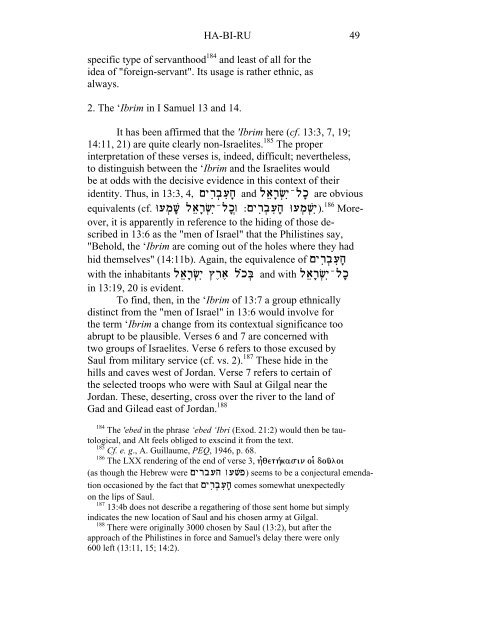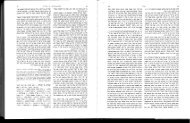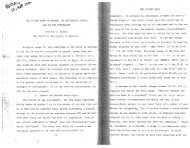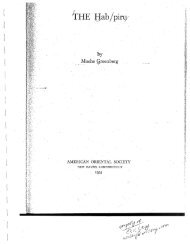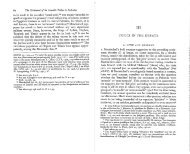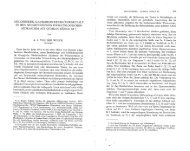The Ha-Bi-Ru--Kin or Foe of Israel? - Gordon College Faculty
The Ha-Bi-Ru--Kin or Foe of Israel? - Gordon College Faculty
The Ha-Bi-Ru--Kin or Foe of Israel? - Gordon College Faculty
Create successful ePaper yourself
Turn your PDF publications into a flip-book with our unique Google optimized e-Paper software.
HA-BI-RU 49<br />
specific type <strong>of</strong> servanthood 184 and least <strong>of</strong> all f<strong>or</strong> the<br />
idea <strong>of</strong> "f<strong>or</strong>eign-servant". Its usage is rather ethnic, as<br />
always.<br />
2. <strong>The</strong> ‘Ibrim in I Samuel 13 and 14.<br />
It has been affirmed that the 'Ibrim here (cf. 13:3, 7, 19;<br />
14:11, 21) are quite clearly non-<strong>Israel</strong>ites. 185 <strong>The</strong> proper<br />
interpretation <strong>of</strong> these verses is, indeed, difficult; nevertheless,<br />
to distinguish between the ‘Ibrim and the <strong>Israel</strong>ites would<br />
be at odds with the decisive evidence in this context <strong>of</strong> their<br />
identity. Thus, in 13:3, 4, Myrib;fihA and lxerAW;yi-lkA are obvious<br />
equivalents (cf. Ufm;wA lxerAW;yi-lkAv; :Myrib;fihA Ufm;w;yi). 186 M<strong>or</strong>e-<br />
over, it is apparently in reference to the hiding <strong>of</strong> those de-<br />
scribed in 13:6 as the "men <strong>of</strong> <strong>Israel</strong>" that the Philistines say,<br />
"Behold, the ‘Ibrim are coming out <strong>of</strong> the holes where they had<br />
hid themselves" (14:11b). Again, the equivalence <strong>of</strong> Myrib;fihA<br />
with the inhabitants lxerAW;yi Cr,x, lkoB; and with lxerAW;yi-lkA<br />
in 13:19, 20 is evident.<br />
To find, then, in the ‘Ibrim <strong>of</strong> 13:7 a group ethnically<br />
distinct from the "men <strong>of</strong> <strong>Israel</strong>" in 13:6 would involve f<strong>or</strong><br />
the term ‘Ibrim a change from its contextual significance too<br />
abrupt to be plausible. Verses 6 and 7 are concerned with<br />
two groups <strong>of</strong> <strong>Israel</strong>ites. Verse 6 refers to those excused by<br />
Saul from military service (cf. vs. 2). 187 <strong>The</strong>se hide in the<br />
hills and caves west <strong>of</strong> J<strong>or</strong>dan. Verse 7 refers to certain <strong>of</strong><br />
the selected troops who were with Saul at Gilgal near the<br />
J<strong>or</strong>dan. <strong>The</strong>se, deserting, cross over the river to the land <strong>of</strong><br />
Gad and Gilead east <strong>of</strong> J<strong>or</strong>dan. 188<br />
184 <strong>The</strong> 'ebed in the phrase ‘ebed ‘Ibri (Exod. 21:2) would then be tau-<br />
tological, and Alt feels obliged to exscind it from the text.<br />
185 Cf. e. g., A. Guillaume, PEQ, 1946, p. 68.<br />
186 <strong>The</strong> LXX rendering <strong>of</strong> the end <strong>of</strong> verse 3, h]qeth


